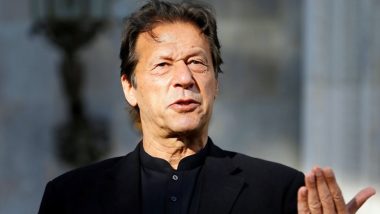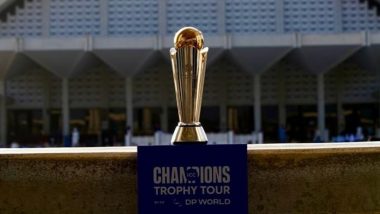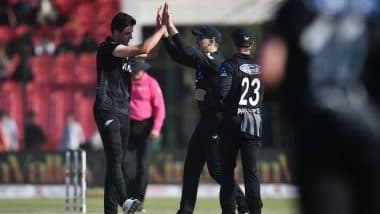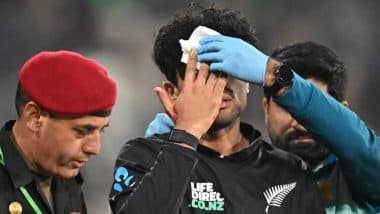Islamabad, Oct 21: In a major setback to former prime minister Imran Khan, Pakistan's top election body on Friday disqualified him from holding public office for five years in the Toshakhana case for hiding proceeds from the sale of gifts he received from foreign leaders.
After the consensus ruling by a four-member bench headed by Chief Election Commissioner Sikander Sultan Raja, the Pakistan Tehreek-e-Insaf (PTI) chairman cannot become a member of the parliament for five years. Pakistan Army Chief Qamar Javed Bajwa to Retire on November 29, Not to Seek Extension.
The decision was taken unanimously by the five-member bench. However, the member from Punjab was not present for the announcement. The ruling coalition government lawmakers had filed a case with the Election Commission of Pakistan (ECP) in August against 70-year-old Khan seeking his disqualification for failing to reveal the proceeds from the sale of gifts that he purchased at a discounted price from the state repository, also called Toshakhana.
The ECP after hearing the case had reserved its judgment on September 19 on the conclusion of the proceedings. The bench of the ECP on Friday unanimously ruled that Khan was involved in corrupt practices and was disqualified as a member of the parliament. It also announced that action would be taken against him under the corrupt practices laws.
Asad Umar, Secretary General of Khan's party, announced that the decision would be challenged in the Islamabad High Court.
Fawad Chaudhry, another PTI leader, rejected the verdict and asked Khan's followers to stage protests. The ruling came days after Khan's party on Monday swept the crucial by-elections, winning six out of eight National Assembly seats and two out of three provincial assembly seats.
Khan, who contested seven National Assembly seats in the crucial by-elections held on Sunday, emerged victorious in six constituencies.
Reflecting on the constitutional role of the ECP during a press conference on Friday, senior PTI leader Shah Mahmood Qureshi said that "a minus one formula will not be acceptable". Earthquake in Japan: Quake of Magnitude 5.1 Strikes Off Fukushima Prefecture, No Tsunami Warning Issued.
"The ECP is a constitutional institution," said Qureshi noting that "free, fair, and credible elections" was the responsibility of the watchdog. "In no way will a minus one formula be considered acceptable," he added.
Law minister Azam Tarar in his reaction termed the decision as "appropriate" and based on merit. “He (Khan) has been disqualified for five years and the ECP has also asked for his trial in a court of law for concealing assets,” he said.
Meanwhile, there were reports of protest in various cities against the decision including an incident of firing by a police guard of a lawmaker near the ECP building. Later, the guard as well as the lawmaker were arrested by police.
Khan, who came to power in 2018 apparently received expensive gifts from rich Arab rulers during official visits, which were deposited in the Toshakhana. Later, he bought the same at a discounted price as per the relevant laws and sold the same at hefty profits but failed to reveal the same to the ECP.
Though morally apprehensive for rulers like Khan, who always takes a high moral ground and leaves no occasion to castigate his opponents as “corrupt”, the purchase and sale were legally allowed.
The former premier informed the ECP during the hearing that the sale of the gifts that he had procured from the state treasury after paying Rs 21.56 million fetched about Rs 58 million. The gifts, among others, included a Graff wristwatch, a pair of cufflinks, an expensive pen, a ring and four Rolex watches.
According to his opponents, Khan failed to show the sales in the income tax returns, making him liable.
The case filed with the ECP seeks his disqualification under Articles 62 and 63 of the Constitution which suggests disqualification if someone is not truthful.
Established in 1974, the Toshakhana is a department under the administrative control of the Cabinet Division and stores precious gifts given to rulers, parliamentarians, bureaucrats, and officials by heads of other governments and states and foreign dignitaries.
Khan was ousted from power in April after losing a no-confidence vote in his leadership, which he alleged was part of a US-led conspiracy targeting him because of his independent foreign policy decisions on Russia, China and Afghanistan. The cricketer-turned-politician, who came to power in 2018, is the only Pakistani Prime Minister to be ousted in a no-confidence vote in Parliament.
(This is an unedited and auto-generated story from Syndicated News feed, LatestLY Staff may not have modified or edited the content body)













 Quickly
Quickly




















